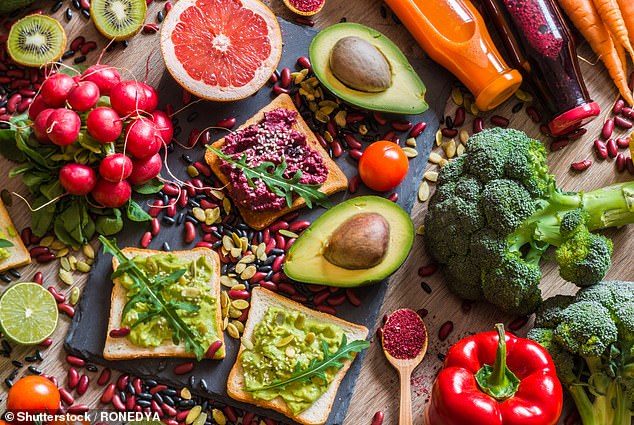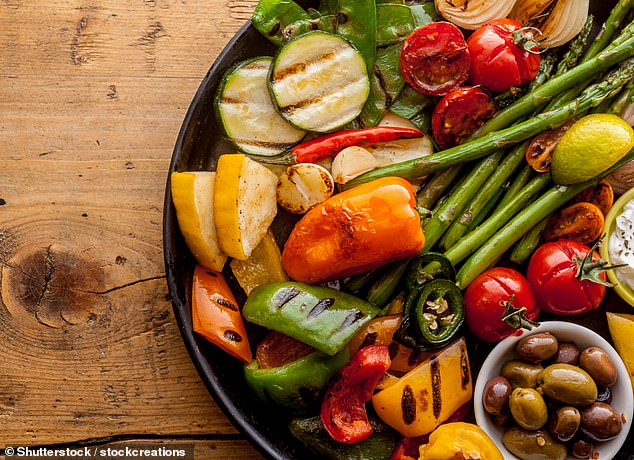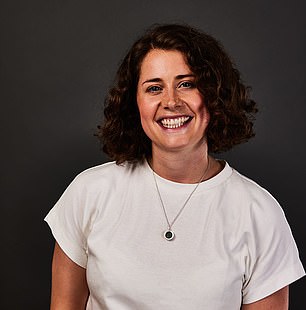Food for thought: Experts reveal what Veganuary does for your body as Brits go a whole month without meat – but is it worth it?
As we enter another new year, meat eaters in Britain are ditching their steaks and sausages this week and taking on Veganuary.
Replacing a meat diet of chicken and beef burgers with plant-based alternatives is a challenge thousands of people take on every January – but there are things to consider before taking the plunge.
For 31 days, determined foodies around the world are pledging to switch to veganism as part of nonprofits' call to action.
The challenge first took place in 2014 and since then millions of people have tried it – but is it worth it?
MailOnline spoke to experts about the pros and cons, along with tips and advice, to help you decide whether to try it out this month.

As we enter another new year, meat eaters in Britain are ditching their steaks and sausages and taking on Veganuary
Dr. Sarah White, Associate Clinical Director at Bupa Health Clinics, advises that following a vegan diet can have 'huge health benefits, even if you only follow it for a short period of time'.
She explains: 'Vegan diets tend to be much higher in fruit and vegetables, which are rich in vitamins and minerals and high in fibre.
'In addition to doing your bit for the environment, veganism can help you lose weight or maintain a healthy weight, lower cholesterol levels and blood pressure, and may also reduce the risk of developing diabetes, heart disease and reduce cancer.
'Many often report clearer skin, better gut health and it can also reduce inflammatory responses if you have rheumatoid or other inflammatory forms of arthritis.'
While she believes that a “balanced vegan diet should give you the vitamins and minerals you need,” there may still be a risk of nutritional deficiencies.
She suggests: 'If you go vegan, take extra care in planning and balancing your diet. You may need to take nutritional supplements.
'People who are vegan are at greater risk of developing anemia if they don't eat iron-rich foods. There may also be a deficiency of vitamin B12 and omega-3, which can make people feel more tired or lead to a lack of concentration.
'You can get iron from dried fruit, whole grains, nuts, seeds, peas, beans and lentils; Vitamin B12 from fortified foods such as grains, soy yogurt and other dairy alternatives and Omega 3 from walnuts, linseed (linseed), chia seeds and hemp seeds.'


Replacing a meat diet of chicken and beef burgers with plant-based alternatives is a challenge thousands of people take on every January – but there are things to consider before taking the plunge
Katherine Pardo, a nutritionist at Nutri Advancedagrees that you should 'plan carefully in advance' before 'going ahead' with veganuary.
She explains: 'Veganuary has numerous pitfalls that may not be immediately obvious.
'In particular, throwing away meat without carefully considering the nutrients that need to be replaced can quickly lead to nutritional deficiencies.
'Those who follow a plant-based diet are especially at risk for deficiencies in micronutrients such as iron, vitamin B12, calcium and zinc, and may also struggle to include adequate sources of protein and omega-3 fatty acids in their diet, which are easier to are obtained through meat and fish.
'Deficiencies in these nutrients can wreak havoc on both physical and mental health in the long term due to their importance to physiological and metabolic processes.'
The nutritionist advises: 'By including plenty of natural whole foods such as green leafy vegetables, bok choy, watercress, tofu, sesame seeds, tahini, legumes, lentils, beans, chickpeas, nuts, seeds and whole grains in the diet, many of the most common micronutrient deficiencies can be avoided.
'However, iron and vitamin B12 can be particularly difficult to obtain from plants, so it may be wise to supplement with these, or with a good quality multivitamin for a full spectrum of nutrients.




Dr. Sarah White, Associate Clinical Director at Bupa Health Clinics (LEFT), advises that following a vegan diet 'can have huge health benefits, even if you only follow it for a short period of time'
'Also try replacing meat proteins with natural plant-based protein alternatives such as beans, lentils, chickpeas, tofu, mushrooms and nuts, rather than using fake meat substitutes that can be highly processed and often contain additives and preservatives that can be harmful to your health and the health. the microbiome.
'I would also advise paying particular attention to omega-3 fatty acids, which are commonly found in oily fish, as our bodies cannot make these essential fats from other fats in the diet. Omega-3 fatty acids are found in walnuts, flaxseeds, hemp and chia seeds, so it is highly recommended that you include these in your daily meal plan.”
GoustoNutritionist Ellie Bain adds that 'to reap the benefits of a vegan diet, you should eat a variety of different plant-based foods' to ensure you get all the vitamins, minerals and protein you need.
She says: 'On a plant-based diet you can do lots of different things… just eating chips would be considered plant-based, but it's certainly not that healthy.
'A mixture of thirty different plant foods per week is a good goal to optimize your gut health; that includes all herbs, spices, fruits, vegetables, lentils and beans.
'A plant-based diet is often high in fibre, which is great if you want to lose weight. You will then feel full for longer because fiber-rich food is digested more slowly by the body. Fiber is also great for gut health and helps blood sugar levels, which can reduce the risk of type 2 diabetes.
Adding: 'Nuts and seeds are a source of good fat, which is good for your skin, hair and nails, but is also a good boost for your brain health. Leafy greens, citrus fruits and berries are a great source of antioxidants and help keep your cells healthy and protected from damage.
'A plant-based diet will generally have lower levels of saturated fats because the main source of saturated fats comes from animal products. This makes a vegan diet great for keeping your cholesterol levels healthy, reducing your risk of developing heart disease.”
However, she advises you to be wary that some meat alternatives may contain more fat and salt compared to their meat equivalents and that the high fiber content caused by eating more fruits, vegetables and beans can result in bloating and discomfort. wind. helps increase gradually so your body can adapt to the change in your diet.
The nutritionist concludes: 'From a health and sustainability perspective, we don't all have to become vegan to optimize our diet.
'However, most of us could cut back on animal products. By eating mainly a plant-based diet, with a little meat and dairy, you can prevent deficiencies and still provide many health benefits.'
